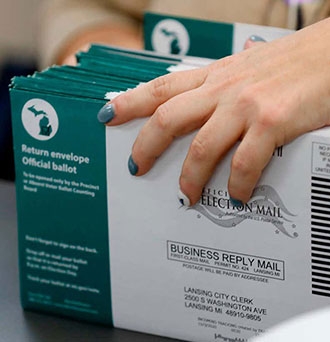
This election cycle, the climate crisis is on Americans’ minds. In an October poll from the New York Times and Siena College, 58% of people surveyed said they were “very concerned” or at least “somewhat concerned” about climate change, and potential voters in swing states expressed worry about its effects in their communities. Across the country, environmentalists are hard at work to make sure those climate-conscious voters turn out.
Thousands of volunteers with the youth-led climate advocacy group, the Sunrise Movement, for instance, are phonebanking in swing states, pushing first-time voters to cast their ballots, and encourage their friends to do the same.
“So far, we’ve reached 2.1 million unique voters for the general election in key states through dials, texts, postcards, and [campus organizing],” Neha Desaraju, an organizer with Sunrise, said.
Sunrise’s 2,300 volunteers are encouraging their constituents to vote for Democratic nominee Joe Biden for president, as well as for the Green New Deal candidates they’ve endorsed further down the ballot. Five thousand volunteers with another group, the Environmental Voter Project, are simply encouraging voters to head to the polls in general.
“When we’re reaching out to potential voters, we never ever talk about specific candidates,” Nathaniel Stinnett, founder and executive director of the Environmental Voter Project, said. “We never even mention the climate or the environment.”
Instead, Stinnett’s organization uses data on voters’ histories combined with polling to identify potential voters who list climate change as a top concern, but are unlikely to vote in elections.
“We’re not trying to change people’s minds, we’re trying to change the behavior of the people whose minds are already there,” Stinnett said.
It appears these organizing efforts are already having an impact. Environmental Voting Project data shows that in swing states like Arizona, Pennsylvania, and Florida, 21% of the 26.5 million total ballots that were already cast during early voting came from voters who are likely to list environmental concerns among their top political priorities. Of those nearly 4.8 million climate-conscious early voters, roughly one-third were people who the group targeted as unlikely voters.
“That’s almost 560,000 of them who were mostly first time voters or otherwise hadn’t voted in an election in maybe a decade,” Stinnett said.
Young people, who are more likely to prioritize climate policy at the ballot box, have also been turning out in droves. Recent data from Tufts University’s Center for Information and Research on Civic Learning and Engagement found that a week before from the election, early youth voting increased from 2016 in most states. If even more young people and other eco-conscious voters turn out, it could make a big difference in the election, particularly in battleground states like Texas, where Desaraju is based and where Trump and Biden are neck and neck in the polls.
“Texas has record youth voter turnout, literally the highest in the country,” she said. “I can’t vote (I’m 17), but I genuinely did not believe this would happen in my lifetime.”
Though Biden wasn’t Sunrise’s first choice for the presidency—the group endorsed Bernie Sanders in the primary race—Desaraju said his success is critical to the future of climate policy, since the proposals the organization has pushed under a Green New Deal have a far better chance of passing under him than under Trump.
“We made climate the standout public narrative this election cycle, and all that would really be put to work in a Biden administration,” she said.
Though youth are more likely to prioritize climate than older voters, not all eco-conscious voters are young. A recent NPR/PBS NewsHour/Marist poll showed that 12% of all voters across America listed climate or the environment as their top priority.
“Let’s say there’s 160 million people who come out to vote this year. Twelve percent of that is something like 19 million people,” Stinnett said. “That’s a huge voting bloc. That’s four times as many people as there are NRA members. That is a politically powerful constituency.”
But that power will go to waste, he said, if those millions of people stay home this election cycle.
“Politicians know who votes and who doesn’t vote. It’s public record,” he said. “Politicians only care about getting enough votes to win elections. They want our votes. We need to show them that good climate policy will get them there, that it can win them elections.”
